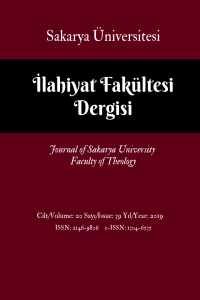Aile İçi Şiddetin Önleyicisi Olarak İslam’ın Merhamet Temelli Aile Modeli
Compassion-Based Family Model of Islam as a Preventative of Domestic Violence
Author(s): Sevde Düzgüner, Huriye MartıSubject(s): Psychology, Theology and Religion, Islam studies, Family and social welfare
Published by: Sakarya üniversitesi
Keywords: Ḥadīth; Psychology of Religion; Psychology of Worship/Religious Rituals; ʿUmra Worship; Meaning in Life; Hopelessness; Islam; Family; Violence; Compassion;
Summary/Abstract: The violence, which is in search of solutions all over the world, stands before us as a major problem on a mass scale. Domestic violence, on the other hand, has a spiral structure that threatens not only individuals but also the present and future of societies. Considering that the individuals who will build the future grow up in today's families, the importance of combating domestic violence can be seen more clearly. Combating domestic violence, which is a multivariate phenomenon, should also be multidimensional. At this point, religious references gain importance. Because religion has a determining and directing effect on all attitudes of people towards life. For this reason, it is important to transfer correct information based on the Qur’ān and circumcision in combating domestic violence. In the article, the sources, causes and types of domestic violence are mentioned. It has been suggested that rather than the risk factors in which violence occurs, it is underlined that the violence is perpetrated by an individual and that it should be educated. It was revealed that verses and ḥadīths never approve of violence, and it was explained that the family model of Islam was based on mercy. It has been stated that compassion is not just an emotion, it involves developing a positive attitude towards all living things by becoming a part of the person's personality. The role of the compassion-based family model of Islam in the prevention of violence has been revealed by scientific research as well as religious sources. [You may find an extended abstract of this article after the bibliography.]
Journal: Sakarya Üniversitesi İlahiyat Fakültesi Dergisi (SAUIFD)
- Issue Year: 22/2020
- Issue No: 42
- Page Range: 457-482
- Page Count: 26
- Language: Turkish

